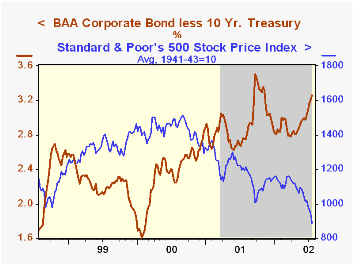 Global| Jul 24 2002
Global| Jul 24 2002The Dollar Rises & Commodity Prices Fall
by:Tom Moeller
|in:Economy in Brief
Summary
The trade weighted value of the US dollar rose more than 1% yesterday in a brief reversal of a trend that has carried the dollar's trade weighted value down more than 10% since February. During the dollar's decline, the deflating [...]

The trade weighted value of the US dollar rose more than 1% yesterday in a brief reversal of a trend that has carried the dollar's trade weighted value down more than 10% since February.
During the dollar's decline, the deflating stock market has heightened concern that recent improvement in the US economy may be short-lived. Suggestions of near-term Fed ease have furthered the dollar's drop.
The dollar's slump this year has cut the gain versus late 1999 to just over 6%.
Commodity prices also have reversed a recent trend which saw them strengthen over 16% during the first half of 2002. The JoC-ECRI Industrial Materials Price Index is down more than 2% since the June highs.
Lower petroleum prices and lower prices in the "miscellaneous" category account for the Index's decline. Metals and textile prices were up slightly during the period.
Versus the highs of 2000 commodity prices are down roughly 9%.
Junk Bond Spread Widens As Stocks Fallby Tom Moeller July 24, 2002

US Treasury yields have fallen nearly 100 basis points from mid-March, to 4.5% for the 10 Year from 5.4%.
During the same period, yields on BAA corporate bonds also are down but to a lesser degree. Yields are near 7.8% versus 8.15% in mid-March, a decline of just 35 basis points
The widening of the spread between Corporates and Treasury's represents concern about the economy's future as represented by nearly a third drop in stock prices during the period.
Tom Moeller
AuthorMore in Author Profile »Prior to joining Haver Analytics in 2000, Mr. Moeller worked as the Economist at Chancellor Capital Management from 1985 to 1999. There, he developed comprehensive economic forecasts and interpreted economic data for equity and fixed income portfolio managers. Also at Chancellor, Mr. Moeller worked as an equity analyst and was responsible for researching and rating companies in the economically sensitive automobile and housing industries for investment in Chancellor’s equity portfolio. Prior to joining Chancellor, Mr. Moeller was an Economist at Citibank from 1979 to 1984. He also analyzed pricing behavior in the metals industry for the Council on Wage and Price Stability in Washington, D.C. In 1999, Mr. Moeller received the award for most accurate forecast from the Forecasters' Club of New York. From 1990 to 1992 he was President of the New York Association for Business Economists. Mr. Moeller earned an M.B.A. in Finance from Fordham University, where he graduated in 1987. He holds a Bachelor of Arts in Economics from George Washington University.
More Economy in Brief
 Global| Feb 05 2026
Global| Feb 05 2026Charts of the Week: Balanced Policy, Resilient Data and AI Narratives
by:Andrew Cates






